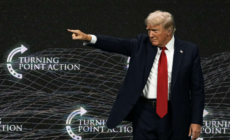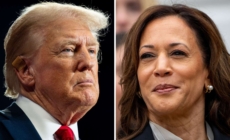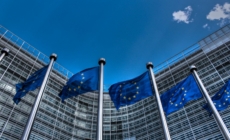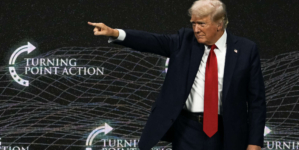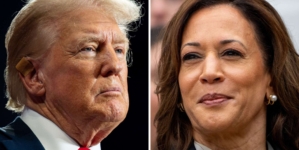-
Tuzson: Attacks on sovereignty more and more open - 15 mins ago
-
Trump Warns of Vote Rigging, Asks Christians to Vote ‘Just This Time’ - 39 mins ago
-
Pumas vs. Austin FC Leagues Cup Highlights | FOX Soccer - 39 mins ago
-
L.A. neighborhood hit by burglars for at least the third time in July - 44 mins ago
-
Dear readers, jumping and crying out in surprise - 48 mins ago
-
Kamala Harris Lands Fifth Polling Win in 24 Hours - about 1 hour ago
-
Varga: EU supports G20 financial targets - about 1 hour ago
-
O.J. Simpson property auction approved to pay off civil claims - about 1 hour ago
-
It’s all Love: Packers’ success is now in Jordan Love’s hands - about 1 hour ago
-
Szijjarto: EU’s weak interest representation ‘historic sin of Brussels bureaucrats’ - 2 hours ago
Biden Administration Balances Climate Action With Tough Stance on China
President Joe Biden’s administration is further restricting imports of clean-energy technology from China, adding some solar panels and their components to the list of tariffs on Chinese goods such as electric vehicles and batteries announced earlier this week.
The administration is seeking to balance two of Biden’s top priorities—bringing down greenhouse gas emissions causing climate change while building up U.S. clean-energy manufacturing such as solar.
“The impact of Chinese oversupply on U.S. investments in the solar market remains a challenging issue,” John Podesta, senior adviser to the president for international climate policy, said in a press briefing Wednesday.
The administration will immediately end an exemption on tariffs on two-sided, or bifacial, solar panels, Podesta said, adding that a recent trade report found a dramatic increase in imports of those panels, indicating that the exemption was being abused.
Mandel Ngan/AFP via Getty Images
White House National Climate Adviser Ali Zaidi said in the briefing that solar manufacturers had announced $17 billion worth of investments in the U.S. since Biden took office. But he said a more secure supply chain is critical to the industry’s success.
“Vulnerable supply chains inhibit deployment, they slow us down as we chase after emissions reductions in this decisive decade for climate action,” Zaidi said.
Zaidi said the administration is also supporting domestic solar wafer and cell manufacturing with an additional $70 million in solar supply chain funding from the Department of Energy.
The new restrictions come on top of increased tariffs on solar panels and other products Biden announced Tuesday. The tariff rate on solar cells will increase from 25 percent to 50 percent, Biden announced, and the tariff rate on Chinese-made EVs will jump to 100 percent. Other Chinese products facing increased tariffs include lithium-ion batteries, graphite, semiconductors and some grades of steel and aluminum.
Trade groups representing solar and other clean-energy companies generally praised the tough action on Chinese imports.
“The announcement of targeted tariffs threads the needle between sustaining our momentum building out domestic manufacturing, while also standing up to unfair foreign oversupply,” Ray Long, CEO of the American Council on Renewable Energy, said in a statement.
Solar Energy Industries Association President and CEO Abigail Ross Hopper said in a statement that her group was evaluating the full impact but added that “it’s clear that several of these decisions will help improve the business conditions for American manufacturers.”
Automakers have had a more mixed reaction.
“It’s complicated,” John Bozzella said in a lengthy statement from the Alliance for Automotive Innovation trade group, where he is president and CEO.
China is both a major market for U.S. automakers and a major manufacturer of EVs, which the Chinese government has generously supported.
“They’re building too many EVs—too many heavily subsidized EVs—for the domestic market and have no choice but to look abroad to offload those vehicles at budget prices,” Bozzella said.
The U.S. auto industry generally supported the Biden administration’s sweeping new standards this year on tailpipe emissions from passenger vehicles and heavy trucks, rules that will steer the industry toward more EV production. A flood of cheaper Chinese imports, Bozzella argued, would threaten that transition.
“It’s appropriate for the White House to be looking at tools to prevent the U.S. from becoming a dumping ground for subsidized Chinese EVs,” Bozzella said.
However, action to protect U.S. clean-tech manufacturers does not necessarily align with climate action, according to some experts Newsweek spoke with.
“I would say it’s favoring domestic jobs and manufacturing over climate policy,” economist Elaine Buckberg told Newsweek. Buckberg is a senior fellow at the Salata Institute for Climate and Sustainability at Harvard University and was chief economist of General Motors from 2018 to 2023.
“Keeping out Chinese EVs almost certainly delays getting lower-priced EVs into the U.S. market, which would speed the adoption and avoid emissions,” she said.
Energy economics professor Catherine Wolfram, who teaches at the MIT Sloan School of Management, agreed that at least in the short term, the tariffs on Chinese clean technology run counter to climate goals.
“Making electric vehicles, solar panels more expensive means fewer people will buy or deploy them and so that’s bad for the climate,” Wolfram told Newsweek. “But in the longer run, it’s important to think about the political base of support for U.S. climate action.”
If big parts of the U.S. workforce view clean-energy technology as a threat due to job losses from unfair foreign competition, Wolfram argued, public support for policies to reduce greenhouse gas emissions would fade.
Podesta made a similar point in his comments to reporters Wednesday.
“You have to have a durable strategy that’s going to invest in the sector, to invest in innovation, to build the kind of virtuous cycle of investment in manufacturing that’s going to bring down our emissions,” he said.
Podesta is Biden’s point person for international climate negotiations, and China, the world’s largest source of new carbon dioxide emissions, plays a major part in those talks.
China’s Foreign Ministry spokesperson Wang Wenbin said this week in a press briefing that the tariffs on China’s EVs and solar panels were “self-defeating” and contrary to recent agreements on a joint U.S.-China climate response.
“It will harm the world’s green economic transition and climate action,” he warned.
Podesta said his talks with his Chinese counterpart earlier this month were “productive,” but it seems clear that Biden’s new tariffs and the threat of a broader trade war will complicate his job to find room for agreement amid fierce competition between the two countries.
“We have an obligation to our citizens and the people of the world to cooperate and even collaborate, where we can, to tackle the climate crisis,” Podesta said.
Uncommon Knowledge
Newsweek is committed to challenging conventional wisdom and finding connections in the search for common ground.
Newsweek is committed to challenging conventional wisdom and finding connections in the search for common ground.
Source link

